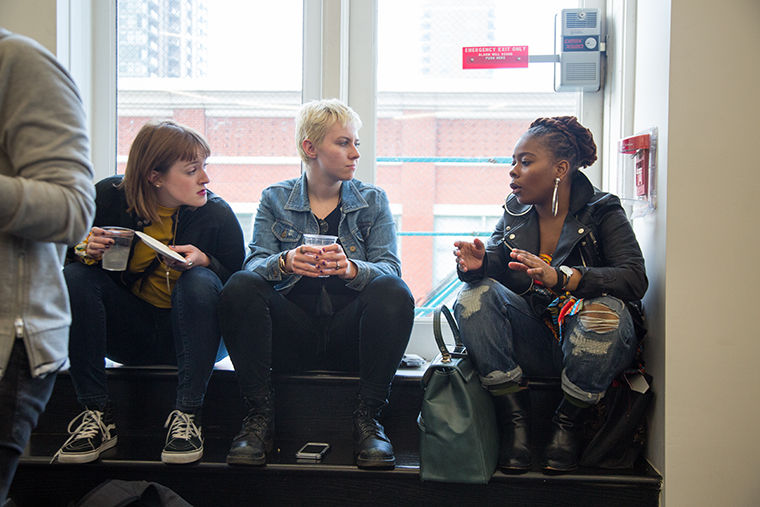Feminist film festival showcases variety of stories
Filmmakers and audience members alike were able to discuss topics the mainstream film scene did not often cover, such as immigration, female fertility and mental illness, at the Chicago Feminist Film Festival on April 21 and 22 at the Conaway Center, 1104 S. Wabash Ave.
May 2, 2016
The First Annual Chicago Feminist Film Festival in 42 years created an opportunity for national and international filmmakers to display work confronting topics not often addressed by mainstream media, such as immigration, women’s reproductive concerns and mental illness.
The festival, held April 21 and 22 at the Conaway Center, 1104 S. Wabash Ave., featured an array of genres including documentary, horror and comedy, according to Susan Kerns, an assistant professor in the Cinema Art + Science Department who co-founded and co-directed festival. The festival displayed 42 short films, as well as a feature film screening of American filmmaker Anna Rose Holmer’s “The Fits,” which featured a subsequent Q&A with Holmer, and an ongoing viewing of the Emblematic Group and 371 Productions’ virtual reality film “Across the Line.”
“We let people tell us how they felt their film was feminist,” Kerns said. “There is no one way to interpret feminism, and we wanted that [message] to show in the diversity of choices we made in our programming.”
Michelle Yates, an assistant professor in the Humanities, History & Social Sciences Department who co-founded and co-directed the festival with Kerns, said the event was designed to expand the audience’s view of feminism. She also said the festival offered a chance for groups not frequently discussed in mainstream media to tell their stories.
“There is a need to have spaces where underrepresented people can be represented,” Yates said.
The festival was sponsored by the English, Humanities, History & Social Sciences, Cinema Art + Science, Dance and Communication and Media Innovation departments. According to Kerns, festival submissions began in the Fall 2015 Semester.
Elio Leturia, an associate professor in the CMI Department, submitted a documentary called “Tita Turns 100.” The documentary is based on a woman Leturia calls “a double immigrant” because she immigrated to Buenos Aires, Argentina from Spain, and later immigrated to Chicago.
Leturia said the film was a chance to capture a fascinating story about the beauty of aging from a simple woman who sought a better life.
“Something a lot of people do not understand is that you are leaving your soul behind,” Leturia said. “It is a bittersweet experience. You have to adapt to become one of the majority to function.”
Kara Mulrooney, a Milwaukee-based freelance filmmaker and producer who filmed “jazzy@32 (a true story),” which focused on an online psychic community answering women’s fertility questions, said she addressed women’s pressures to have children by age 35.
“You could think of this as a rather serious subject, but the film is pretty funny,” Mulrooney said. “It’s rather absurd.”
Yates said she wanted to model the abundant student involvement after the Davis Feminist Film Festival she participated in during her time at the University of California, Davis. Students from Yates’s “Critical Issues in Cultural Studies: Feminism and Film” Spring 2016 course judged festival submissions to determine those most fitting to display.
Ariel Guerrero, a senior cultural studies major in Yates’s “Critical Issues in Cultural Studies: Feminism and Film” course, said students in the course spent three weeks watching and discussing possible festival films that would address subject matter that was not often discussed in mainstream film, such as forms of oppression and topics of minority groups.
Guerrero said the topic of mental illness stood out to her in the experimental film “Daydreams of Wilderness,” by Filipina filmmaker Amaya Han about a girl with a phobia of interaction.
“Mental illness is often portrayed badly in mainstream media,” she said. “[The film] portrays what it is like to have that mental illness. I personally liked it because it was about accommodation and treating the girl like a human.”
Kerns said film festivals often awaken people to stories outside their own life experiences.
“The fact that we have so many films from so many countries opens avenues for learning and being invested in other people’s lives,” Kerns said. “As we become a more interconnected global community, being invested in each other’s stories is incredibly important.”








